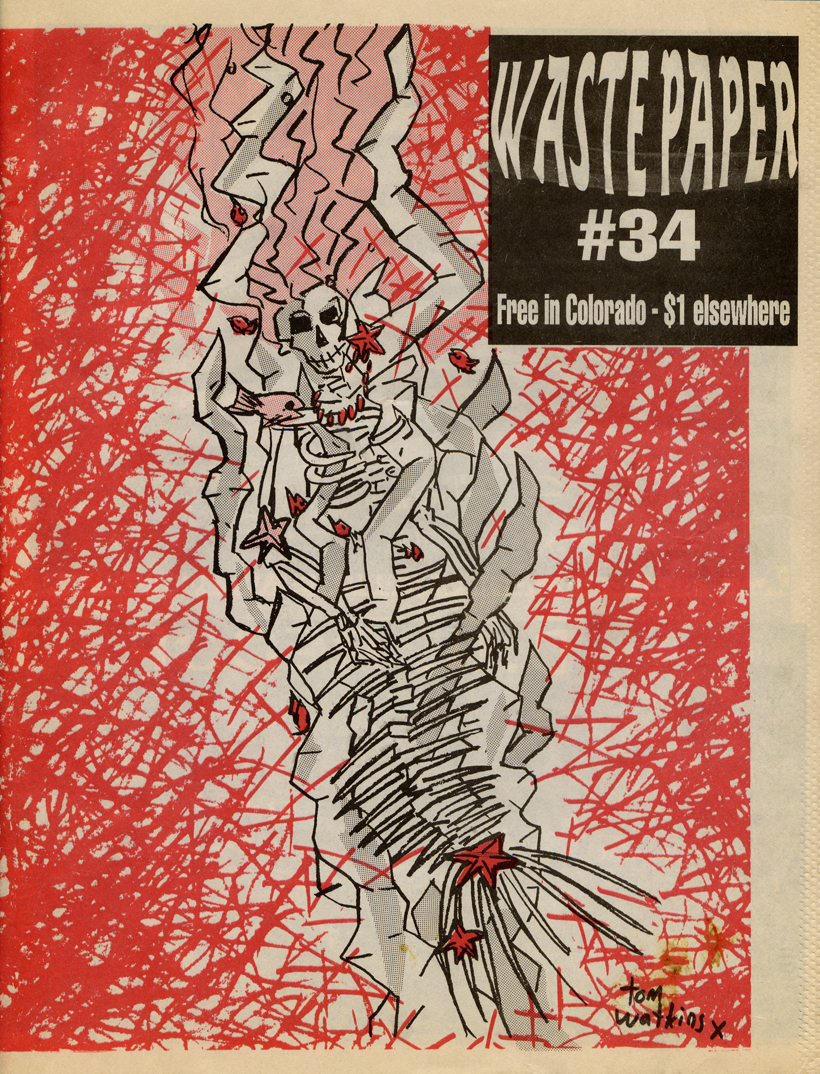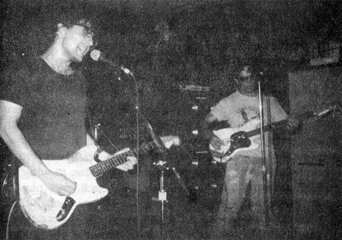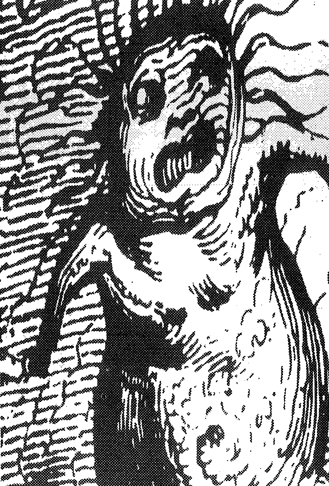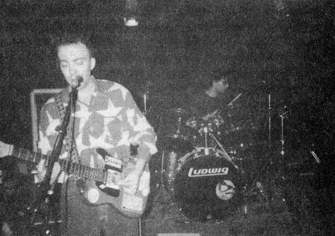
Probably the best band in NY right now, Uncle Wiggly is the fabulous threesome of James Kavoussi – drums, guitar, vocals, Mike Anzalone – bass, vocals, and William Berger – guitar, vocals. Their new LP/CD/Tape “There Was An Elk” is an incredible 80-minute odyssey (on CD, at least). Chilling, at-home pop deconstruction, and plenty of brand new, full-fledged studio classics. Their past two albums (whether on Shimmy-Disc or the rare Austrian-label debut) also capture countless magical music moments: spacious, hook-filled jams and wonderous vocals that once recorded, are instantly memorable. After their New Music Seminar set at the Knitting Factory, the interview was with James Kavoussi and William Berger. From topic to topic, it was so extraordinary, with such hard-hitting Q&A, it was toned down to suit the forum of a music magazine.
MJ: How about the interview?
JK: We’ll start by mentioning the fact that our bass player, Mike, could not be with us this evening, he couldn’t get out of his job. He’s a dogcatcher. A few hundred dogs escaped from a pound up in Westchester, he’s out on the streets trying to round them all up.
WB: He’s got a big net.
MJ: How about your new album, and uh, your other albums?
JK: I personally think that it’s the first record that’s finally come out sounding like what we envisioned it sounding like in our heads. Our first record, which is an import only, is pretty good but we were still pretty new at recording, and because of that, there’s some limitations to it. And with our second album, which is our first domestic release, Kramer insisted after hearing the final product that we remix the entire album at Noise New York. I won’t go into the reasons why, I’ve already insulted Kramer enough in interviews. But it ended up sounding the way he wanted it to sound as opposed to the way we wanted it to. I like the album but…
WB: You should hear the alternate album. The Kramer version is really ultra-wet. Lots of reverb. And there’s one extra song on our version. But I like the fact that “There Was An Elk” has so many disparate levels of fidelity on one record. I like doing things like that.
JK: Not only from song to song, but within one song having there be various levels of fidelity mixed together.
MJ: How about Shimmy-Disc?
WB: I think all the people who work for Kramer, and alternately work with us, are pretty nice, decent people. The problem is that the money isn’t there to pay us anything, other than in promos, which you have to squeeze like water from a rock. And Shimmy-Disc doesn’t do individual artist promotion. You’re never going to see one in a magazine, even for like a Kramer record. When we hooked up with the label, Kramer said, “This is a stepping stone. We get records out, we have good distributors.” They’ve also gotten us a lot of really good press. As an independent label, I’m sure they’re as good or better than a lot of others.
JK: Kramer even told us from the start that anyone who puts out more than three albums on Shimmy-Disc is either lazy or crazy. That’s an actual quote. And, there’s no tour support. In, you know, money or people-power.
MJ: How about the New Music Seminars?
JK: It’s ironic that the New Music Seminars started out and are supposed to still be a chance for unsigned bands to play gigs and be seen by various A&R people from labels, but for some reason, 90% of the shows are label-sponsored, and bands on labels. Showcases. It kind of defeats the original purpose of the seminar.
WB: I like them because there’s people from out of town, old friends from the tour and new friends. It’s nice to meet your fans from around the country. That’s the best part of it, it brings a whole bunch of people together with a common interest.
JK: It’s a bit naďve to think that a label person is coming to town to check out as many new bands as they can, with some great talent to find. Most people, and you can’t blame them for this, come to town to see bands that they know and that they like. It’s a little vacation.
MJ: How about bands you can’t stand?
JK: Oh gosh, we hate to talk about that, even though there are many bands we can’t stand. My philosophy is if you don’t have something nice to say about someone, you shouldn’t mention the fact that you don’t like Cop Shoot Cop…
WB: It’s different now in New York. A couple of years ago, the whole post-Sonic Youth explosion was really prevalent. The loud screeching angry depressing thing was just across the board. We were so much the odd band out a couple of years ago, it was ridiculous. People just thought we were really kooky or something just because we didn’t get up there and rip and tear away. I don’t know how those bands keep it up for a whole 45 minute set just writhing and sweating.
MJ: How about the thought that more and more music focuses less and less on musicianship?
WB: I think it’s going off in a whole bunch of different directions, but I can basically concur with that statement. I think too few people don’t know how to play. Someone like Fred Frith gets up there and will do like a free-improvisation on the guitar, playing with files and brushes, and then kick back and play the most beautiful, melodic thing you’ve ever heard. I tend to like people who can do it all. If you can put together like a great dance track on a sampler, I like to know that the same artist can hands-on actually play a musical instrument too. I always feel like people are getting away with something when they’re just horsing around, putting it out as art. Any of the samples on “Elk” are sounds that we created, then we played the sampler like you’d play the guitar.
JK: When we use samplers, we like to use them more as an instrument, as opposed to a device to take someone else’s sounds. To us, that approach is interesting enough for us to dabble in it, but we wouldn’t want to like totally turn in that direction. That also kind of bleeds into the concept of a lot of bands basing their approach on having a “sound,” as opposed to writing songs. I’m attracted to bands that can do a lot of different things, that impresses me more than a band that has like one thing, and then just does it to death. Even if that one thing is a great thing. You can only take so much of it before you say, you know, “what else do you feel like doing?”
WB: When you play a Sonic Youth record or a My Bloody Valentine record, ultimately you’re still hearing the individual songs. You’re gonna track through your little CD and skip through the ones that aren’t as good. We just streamlined that process. We all write songs, we all share an equal third of the songwriting.
MJ: How about the formation of Uncle Wiggly?
WB: I, for the last 9 years, have been doing a radio show on a New Jersey college station, WFMU. It’s very popular in the New York area as it’s one of the few free-form stations left in the country. I was doing a bi-weekly segment on my show called “Lo-Fi,” and I still say I’m the first person in the country to use that term, I was using it in 1984 before I ever saw it in print, that was the name of the show. I played people’s home recorded tapes sent in to me in the mail. And one of the people who sent me tapes was James, under the name Foaming Edison. We subsequently met at a Half Japanese show and I approached James and said, “I’m in awe of you.” I talked him into coming to my then apartment in Jersey City, and we had a 4-track session and wrote a couple songs together.
JK: “Two Tea Farms And A Pickle Factory” was the first one we wrote together, and was on the first Wiggly album.
WB: There were a couple other songs that really sucked so they didn’t get used.
JK: Well, they didn’t really suck, they were just too difficult to transfer to a band format.
WB: I was just trying to be expedient.
JK: Okay.
WB: So we didn’t have a name yet, but we agreed to form a band. We played a show with our first bassist Terry Folger under the name Penile Bishops. That show went alright, but Terry quit the band immediately after the gig.
JK: An interesting thing about that show, we played with a short-lived band called Happiness, featuring Dogbowl.
WB: James was in the band Fly Ashtray at the time with Mike as the bass player. We recruited Mike for Uncle Wiggly and Uncle Wiggly was born. Our gigs used to be really weird. We used to have lots of things on tape, weird accompaniment.
JK: We used to switch instruments every song.
WB: It gradually got more inconvenient to do that, you’d get to the club and things with the drum machine and 4-track would fuck up. So we just got to the point where we played instruments. Less than a year into our career we had a fourth member, Jenna McGrath, who played every instrument, which enabled James and I to play guitar at the same time on certain songs. She and the three of us had a parting of the ways, we subsequently developed a tight little triangle.
JK: One day when we weren’t paying attention, all of a sudden we were like this real band. Cohesive, tight and suddenly playing gigs on a regular basis. Started thinking about recording our songs and putting them out.
MJ: How about important criteria when judging other bands?
JK: It’s hard to put into words…but it’s nice to see a band not being derivative.
WB: I have a pretty primary rule, as a DJ. For me, it’s just like when you press play or you put the needle to the record, if it makes your head buzz or your feet move, that’s it. The proof is in the recording. There’s no political or image-wise process of elimination process that I use with bands. I like a lot of music that other people would probably consider corny or outdated or whatever, it’s just good music and bad music really.
JK: It’s such a personal thing to an extent. For whatever reasons, the same song will affect each one of us in a totally different way. Because of that, as tempting as it is to do, you really can’t make any generalization that a certain thing is good or the right way to do something. That’s what makes music so interesting, it’s so vague what makes a good song.
WB: I can say that I feel certain feelings of disdain when I see another band limiting themselves, to one thrust or one approach. I always feel like any artist or human being trying to be an artist has got to be worth more than that. I don’t even understand the mentality behind it.
JK: Any human being does not feel just one specific feeling. Therefore, he or she should be able to convey all the various feelings they feel in their art.
MJ: How about a band philosophy?
WB: Do what comes naturally. Don’t be full of shit.
JK: Yeah, that’s…that’s…um…
WB: Or be full of good shit.
JK: Just be natural, yet also strive for trying to come up with songs and arrangements that have some vague sense of originality, and not keep repeating the same thing over and over again. Keep pushing the limits of what we’re physically capable of doing.
WB: While still grabbing the listener by the ears and pulling them past.
JK: This would be a good time to talk about our ska record we’re putting out.
WB: Yeah, Jerry Dammers is coming out of retirement to produce our ska album…just kidding!


